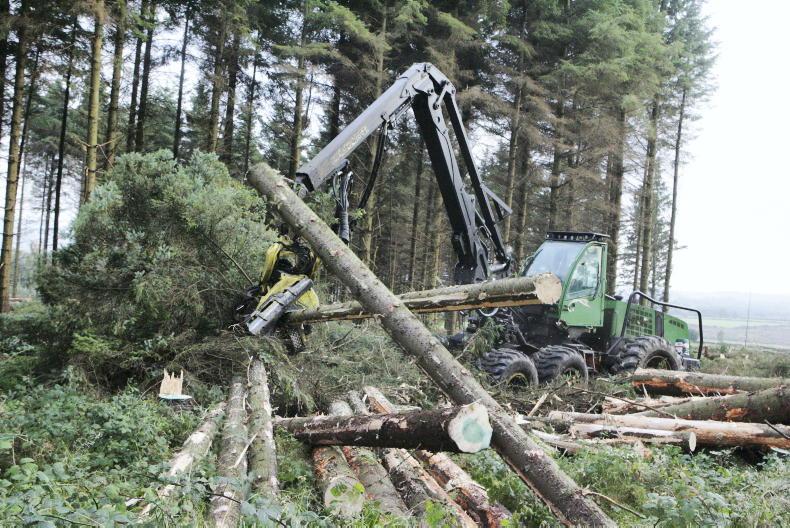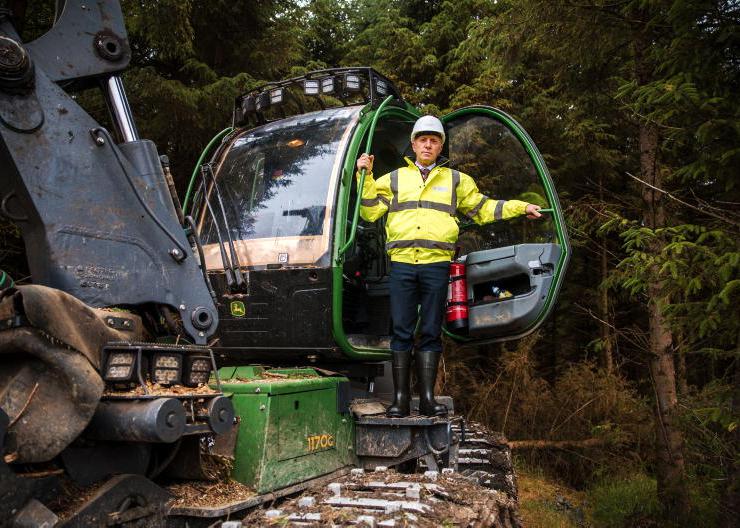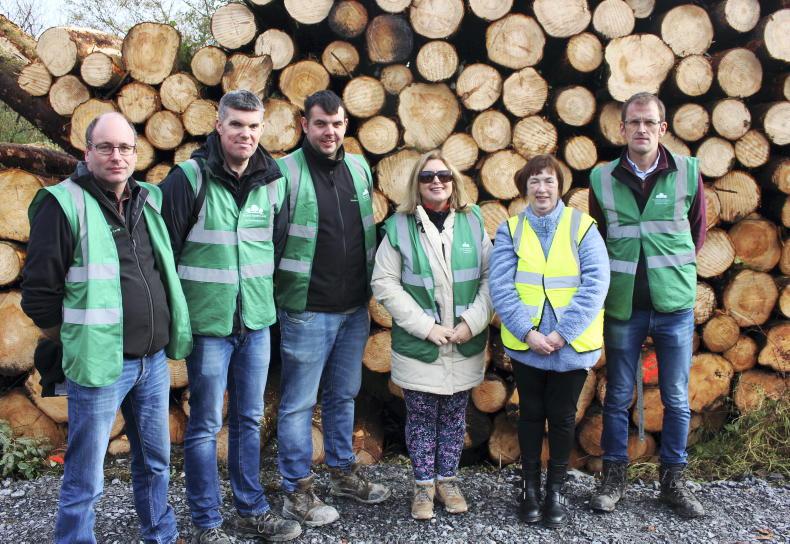Department log supply projections are forecast to increase from 4.6m m3 this year to 6.4m m3 by 2030.
Sawmills, board mills and energy outlets have the capacity to process all of this material but how much of it will reach the market remains uncertain.
Over the past two years, difficulties in obtaining felling licences have caused silvicultural, supply and employment problems for timber processors, forest owners, contractors and forestry companies.
“The felling licence crisis has seriously undermined confidence throughout the forestry and forest products sector,” says Traolach Layton, forestry manager of GP Wood, the Co Cork-based company, with sawmills in Enniskeane and Lissarda.
The markets for sawn timber at home and in the UK are good because of shortages from traditional lumber suppliers
“Having invested in milling capacity to meet the increasing volumes of logs projected, mills have now been forced to import substantial volumes of logs from Scotland, which is unsustainable.”
GP Wood – having faced down the challenge of COVID-19 and Brexit – has been hit hard by the licence debacle.
“The markets for sawn timber at home and in the UK are good because of shortages from traditional lumber suppliers including Scandinavia and Germany,” he explains.
“High selling prices for product have allowed unprecedented log prices for timber growers. Very high log prices have been paid for scarce private lots, flushing out existing licences even for premature clearfells. In fairness to Coillte, it has maintained market-related prices for its logs and has done what it could to keep the industry going but, for 2020, Coillte was only able to supply 75% of its log volume commitments to sawmills.”
Remember, most mills were closed for weeks due to COVID-19 last year, which took pressure off log supply in the first half of 2020
As a result, sawmills struggled to maintain production for the full year and at year-end most mills had depleted operational log stocks.
“These have diminished to skeletal levels and sawmills are operating ‘hand to mouth’, with Coillte offering log lots as they become available,” Layton says. “Remember, most mills were closed for weeks due to COVID-19 last year, which took pressure off log supply in the first half of 2020.”
When asked about the future, he says there has to be continuity of supply, both from Coillte and private forest owners. “In the absence of working log stocks, it is extremely difficult for mills to maintain harvest and haulage infrastructure and to match production with customer needs or to plan with any confidence,” he maintains.
“Coillte is confident that it will have licences to offer forecasted volumes of logs for 2021 but scheduling of sales is out of kilter with normal practice and much of the offer is still dependant on felling licences or road permits.
He admits there is little evidence of an improvement in licensing private lots.
“Logs from private forests are sporadic and scarce with a huge backlog in licence applications.
“I’m glad to see that tackling the licence issue has been prioritised by Project Woodland but a solution needs be found quickly.”
Project Woodland: the IFA view
When the Mackinnon Review was published in November 2019, it was received with much optimism by farmers and the wider industry. The report captured their frustrations but, more importantly, it plotted a path forward. Fast forward 16 months and, let’s be honest, we have not moved very far.
Farmers want action
Farmers have been slow in welcoming Minister of State Pippa Hackett’s newly launched Project Woodland because it feels like déjà vu. It seems like just another report published, while farmers are still waiting to get a licence to manage their forests as the crisis worsens.
Farmers want action. They want to be able to get a licence within four months from a system that respects their rights as forest owners and at a cost that reflects the size of their forest and the scale of the operation.
It is well documented that farmers want an independent external project manager to oversee the implementation of Mackinnon.
The mismanagement of the current licence crisis and the failure of the Department to implement recommendations in the intervening 16 months, makes it clear that an independent project manager is critical to the success of this new plan.
To ensure its success, the IFA is calling on the minister to act immediately
There have been many false dawns in the attempts by the Department to handle this crisis. If this plan is to deliver a more farmer-friendly system, that makes managing forests at farm scale workable again, then it must be properly resourced. To ensure its success, the IFA is calling on the minister to act immediately on the following:
Appoint a dedicated full-time external project manager so that the actions in the report are delivered.Remove the two-tier licence system that prioritises larger forests to the detriment of many farmer forest owners.Pilot the environmental report grant on the 1,100 private felling licences caught up in ecology.Review the forest legislation with the aim of introducing a single consent system.There are a lot of positive actions in Project Woodland but it is very much the first step. The lack of timelines for the delivery is a major concern for farmers and the sooner the working groups can provide clarity the better. If the minister is serious that farmers are the future of the forestry programme then she must listen and act on their concerns.
Department log supply projections are forecast to increase from 4.6m m3 this year to 6.4m m3 by 2030.
Sawmills, board mills and energy outlets have the capacity to process all of this material but how much of it will reach the market remains uncertain.
Over the past two years, difficulties in obtaining felling licences have caused silvicultural, supply and employment problems for timber processors, forest owners, contractors and forestry companies.
“The felling licence crisis has seriously undermined confidence throughout the forestry and forest products sector,” says Traolach Layton, forestry manager of GP Wood, the Co Cork-based company, with sawmills in Enniskeane and Lissarda.
The markets for sawn timber at home and in the UK are good because of shortages from traditional lumber suppliers
“Having invested in milling capacity to meet the increasing volumes of logs projected, mills have now been forced to import substantial volumes of logs from Scotland, which is unsustainable.”
GP Wood – having faced down the challenge of COVID-19 and Brexit – has been hit hard by the licence debacle.
“The markets for sawn timber at home and in the UK are good because of shortages from traditional lumber suppliers including Scandinavia and Germany,” he explains.
“High selling prices for product have allowed unprecedented log prices for timber growers. Very high log prices have been paid for scarce private lots, flushing out existing licences even for premature clearfells. In fairness to Coillte, it has maintained market-related prices for its logs and has done what it could to keep the industry going but, for 2020, Coillte was only able to supply 75% of its log volume commitments to sawmills.”
Remember, most mills were closed for weeks due to COVID-19 last year, which took pressure off log supply in the first half of 2020
As a result, sawmills struggled to maintain production for the full year and at year-end most mills had depleted operational log stocks.
“These have diminished to skeletal levels and sawmills are operating ‘hand to mouth’, with Coillte offering log lots as they become available,” Layton says. “Remember, most mills were closed for weeks due to COVID-19 last year, which took pressure off log supply in the first half of 2020.”
When asked about the future, he says there has to be continuity of supply, both from Coillte and private forest owners. “In the absence of working log stocks, it is extremely difficult for mills to maintain harvest and haulage infrastructure and to match production with customer needs or to plan with any confidence,” he maintains.
“Coillte is confident that it will have licences to offer forecasted volumes of logs for 2021 but scheduling of sales is out of kilter with normal practice and much of the offer is still dependant on felling licences or road permits.
He admits there is little evidence of an improvement in licensing private lots.
“Logs from private forests are sporadic and scarce with a huge backlog in licence applications.
“I’m glad to see that tackling the licence issue has been prioritised by Project Woodland but a solution needs be found quickly.”
Project Woodland: the IFA view
When the Mackinnon Review was published in November 2019, it was received with much optimism by farmers and the wider industry. The report captured their frustrations but, more importantly, it plotted a path forward. Fast forward 16 months and, let’s be honest, we have not moved very far.
Farmers want action
Farmers have been slow in welcoming Minister of State Pippa Hackett’s newly launched Project Woodland because it feels like déjà vu. It seems like just another report published, while farmers are still waiting to get a licence to manage their forests as the crisis worsens.
Farmers want action. They want to be able to get a licence within four months from a system that respects their rights as forest owners and at a cost that reflects the size of their forest and the scale of the operation.
It is well documented that farmers want an independent external project manager to oversee the implementation of Mackinnon.
The mismanagement of the current licence crisis and the failure of the Department to implement recommendations in the intervening 16 months, makes it clear that an independent project manager is critical to the success of this new plan.
To ensure its success, the IFA is calling on the minister to act immediately
There have been many false dawns in the attempts by the Department to handle this crisis. If this plan is to deliver a more farmer-friendly system, that makes managing forests at farm scale workable again, then it must be properly resourced. To ensure its success, the IFA is calling on the minister to act immediately on the following:
Appoint a dedicated full-time external project manager so that the actions in the report are delivered.Remove the two-tier licence system that prioritises larger forests to the detriment of many farmer forest owners.Pilot the environmental report grant on the 1,100 private felling licences caught up in ecology.Review the forest legislation with the aim of introducing a single consent system.There are a lot of positive actions in Project Woodland but it is very much the first step. The lack of timelines for the delivery is a major concern for farmers and the sooner the working groups can provide clarity the better. If the minister is serious that farmers are the future of the forestry programme then she must listen and act on their concerns.










SHARING OPTIONS